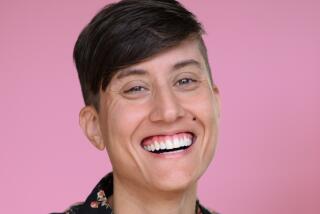Discoveries
- Share via
Finding Ben: A Mother’s Journey Through the Maze of Asperger’s
Barbara LaSalle
McGraw-Hill: 280 pp., $19.95
When Barbara LaSalle’s son Ben was born, he had splotchy skin. He was not a pretty baby. Soon he developed allergies and vision problems. At 18 months, before he could run, he was reading. LaSalle grew used to frequent requests from friends and teachers to hear her “performing genius” recite the Constitution or quote at age 3 from his favorite book, “A Child’s History of the World.” At 2 1/2, he was giving his mother directions in the car. But he was having difficulty making friends. He would “assault them with words.” When Ben was 6, his parents divorced. He soon began lying regularly. In second grade, he began gaining a lot of weight. At 33, when this book was published, Ben weighed 465 pounds.
LaSalle caromed from embarrassment to fierce protectiveness to fear to fury. When Ben’s father refused to provide more money for various therapies, LaSalle gave Ben “away” to his father, who sent him to a boarding school in Arizona. At 18, Ben had his first breakdown and was put in a locked ward in a psychiatric hospital. Once released, he threatened a woman with a knife and ended up in prison. It was not until Ben was 23 that a doctor diagnosed him with autism. LaSalle recognized some but not all of the symptoms and finally came across a paper on Asperger’s syndrome, named for the Viennese doctor who discovered it in 1944.
Asperger’s has several clinical features: “a lack of empathy, one-sided interaction, little ability to form friendships, pedantic speech, poor nonverbal communication, intense absorption in certain subjects, and clumsy and ill-coordinated movements and odd postures.” It was not included in diagnostic manuals until 1994.
“Finding Ben” includes several heart-splitting passages by Ben that give the reader a chance to feel what it is like to live in his body and mind. “Some time in my early childhood, I got the message that telling the truth about myself was something to be avoided at all costs.” How wonderful it would have been if Ben had been diagnosed much earlier in his life, and yet, his mother’s love and his painful path are not wasted. This book is living proof.
*
Dancing Arabs: A Novel
Sayed Kashua
Translated from the Hebrew by Miriam Shlesinger
Grove Press: 228 pp., $12 paper
“The day I saw Jews up close for the first time I wet my pants. Mother was furious, because she’d asked us to keep our clothes clean.” Here is the voice of a young boy from the Israeli Arab village of Tira. His grandfather, who fought the Zionists his whole life, was shot in front of his house during the 1948 war. His father, also a village hero, was imprisoned for protesting and then for bombing the cafeteria at the Hebrew University.
He cannot understand his son’s apolitical nature: “We can’t even draw a flag. He says kids much smaller than us walk through the streets singing ‘P-L-O -- Israel, no!’ and he shouts at us for not even knowing what PLO stands for.” Growing up in an Arab household, the boy is expected to carry the legacy of violence into the future. Instead, he is afraid of Jews.
In elementary school, a student exchange program brings him in contact with Jewish kids his own age for the first time. As a high school student, he cries when he is taken off a bus in a routine check and refuses to get back on. The burden of being the oldest son in a family of heroes builds. A gifted student, he is given a coveted spot in a Jewish school. He is ridiculed there as well as at home.
Amazed by the shiny new school and the privileges the students receive, he longs to pass for Jewish. In Kashua’s hands, you can smell this young man’s flesh and soul rotting from the inside out. He falls for a Jewish girl but marries an Arab. Soon he hates her. He hates himself. He puts himself to sleep “with thoughts of war games.” Books like this one, books that tell the stories of war through the eyes of children, are the textbooks for future generations. They carry the cultural information, those memes that are missing from conventional, nonfiction accounts.






